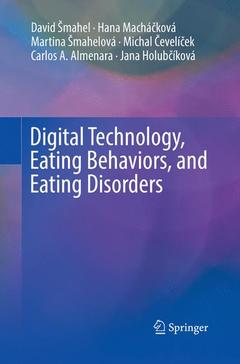Description
Digital Technology, Eating Behaviors, and Eating Disorders, Softcover reprint of the original 1st ed. 2018
Authors: Šmahel David, Macháčková Hana, Šmahelová Martina, Čevelíček Michal, Almenara Carlos A., Holubčíková Jana
Language: English
Approximative price 52.74 €
In Print (Delivery period: 15 days).
Add to cartPublication date: 01-2019
199 p. · 15.5x23.5 cm · Paperback
Approximative price 73.84 €
In Print (Delivery period: 15 days).
Add to cartPublication date: 09-2018
Support: Print on demand
Description
/li>Contents
/li>Biography
/li>Comment
/li>
?After decades of research on dysfunctional eating and lack of physical activity, research attention has finally turned to the role of digital technology in eating behaviors and eating disorders. This timely volume offers a thoughtful and wide collection of chapters discussing the possible effects of digital technologies, from those enhancing healthy eating behaviors to those that encourage disordered eating. Highly recommended for both professionals and scholars.?
Prof. Giuseppe Riva, Università Cattolica del Sacro Cuore, Milan, Italy.
This book examines in depth the multifaceted roles of digital technologies in the eating behaviors and eating disorders. Coverage reflects a broad theoretical and empirical knowledge of current trends in digital technology use in health behaviors, and their risks and benefits affecting wellbeing, with focus on eating behaviors and eating disorders. The authors use both qualitative and quantitative data to focus on the digital lived experiences of people and their eating related behaviors.
Among the topics covered:
- The quality of eating-oriented information online
- Technology, body image, and disordered eating
- Eating-oriented online groups
- Using mobile technology in eating behaviors
- Usage of digital technology among people with eating disorders
- What healthcare professionals should know about digital technologies and eating disorders
- Technology-based prevention and treatment programs for eating disorders
A potential source of discussion and debate in various fields across the social sciences, the health sciences, and psychology, Digital Technology, Eating Behaviors, and Eating Disorders will be especially useful to students, academics, researchers, and professionals working in the fields of eating behaviors and eating disorders.
David Smahel, Ph.D. is a Professor at the Faculty of Social Studies and the Faculty of Informatics, Masaryk University, Czech Republic. He is a member of the Interdisciplinary Research Team on Internet and Society (IRTIS: irtis.fss.muni.cz), which researches the social-psychological implications of the internet and technology. Current research focuses on digital technology and health, adolescents’ and adults’ internet use, the online risks of children and adolescents, online addictions and ICT security. He is the editor of Cyberpsychology: Journal of Psychosocial Research on Cyberspace and co-authored the book Digital Youth: The Role of Media in Development (Springer, 2011).
Hana Machackova, Ph.D. is a postdoctoral researcher at Masaryk University, Czech Republic, where she works at the Faculty of Social Studies. She is a member of the Interdisciplinary Research Team on Internet and Society (IRTIS). Her research interests include online aggression and cyberbullying, online communities, health and digital technology, online participation, and self-disclosure and privacy on the internet.
Martina Smahelova, M.A. is a junior researcher at the Institute for Research on Children, Youth and Family, Faculty of Social Studies at Masaryk University, Czech Republic and a member of the Interdisciplinary Research Team on Internet and Society (IRTIS). Her main interest lies in qualitative data analysis and she studies the experiences of children and families in the context of new media, the behavior of children on the internet, and privacy and self-disclosure on the internet. She also works on research in the area of health and technologies.
Michal Cevelicek, Ph.D. is a postdoctoral researcher at the Department of Psychology, Faculty of Social Studies, Masaryk University, Czech Republic. He is a member of the Center for Psychotherapy Research Brno and a member of the Interdisciplinary Research Team on Internet and Society (IRTIS
First book to offer a broad perspective of eating disorders and technology-based treatment
Incorporates the latest research
Contains illuminating interviews with clients and therapists
Includes all types of technology that may be used in interventions

